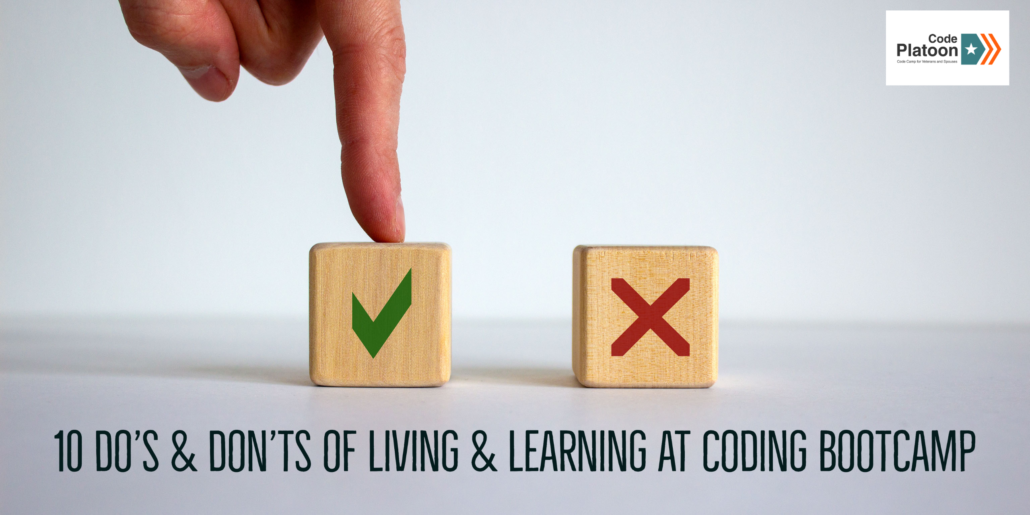
TLDR: Coding bootcamps are intense but rewarding. To succeed in coding bootcamp, balance work and rest: take breaks, stay hydrated, exercise, and avoid burnout. Build relationships with peers, find a mentor, and collaborate often. Focus on understanding error messages, breaking problems into smaller steps, and learning how code works rather than memorizing everything. Most importantly, don’t compare yourself to others—progress at your own pace.
Starting a coding bootcamp is an exciting step toward launching a career in tech. Whether you’re transitioning into tech from a different field or diving into your first formal programming education, bootcamps are intense and immersive experiences designed to get you job-ready in a short time.
To help you make the most of your bootcamp journey, we’ve put together ten practical “dos and don’ts” to help you thrive as a student. These tips cover both living and learning, ensuring you stay healthy, focused, and prepared to succeed.
Living Dos and Don'ts
1. Don’t Burn Yourself Out
Great software engineers know how to make the complex simple. You might be explaining a technical concept to a non-technical stakeholder or breaking down a problem for your team. Employers value engineers who can communicate ideas clearly, whether it’s through verbal discussions, email updates, or clean, well-documented code.
In the military, clear communication can mean the difference between mission success and failure. You also learned to adapt your language depending on whether you were briefing a commanding officer or explaining details to civilians. That same precision is invaluable when translating technical jargon into actionable insights to stakeholders in a tech environment.
Bootcamps are fast-paced, but working around the clock won’t get you to the finish line any faster. Pushing yourself too hard can lead to burnout, leaving you exhausted and unproductive. Instead, give yourself time to recharge each week.
2. Do Take Breaks and Stay Hydrated
When you're deep in problem-solving mode, it’s easy to forget to pause. However, taking short, regular breaks can help you think more clearly and prevent frustration. Staying hydrated is just as important—keeping a water bottle handy while you code can make a big difference in your energy and focus.
3. Do Prioritize Exercise
Coding can be a sedentary activity, so it’s essential to prioritize your physical health. Even a twenty-minute walk, some stretches, or a quick workout can relieve stress, boost your mood, and improve your concentration. Your physical health is just as important as your technical skills.
4. Do Find a Mentor
A mentor can provide valuable insights, give constructive feedback on your work, and guide you through the challenges of bootcamp. Many coding bootcamps, including Code Platoon, offer access to experienced mentors who can help you navigate your studies and career aspirations.
5. Do Build Relationships with Your Peers
Your cohort will be your greatest resource during the program. Your peers are going through the same experience and can provide support, collaboration, and fresh perspectives on difficult problems. Don’t hesitate to ask questions or offer help—it’s a two-way street that benefits everyone.
Learning Dos and Don'ts
6. Do Read and Understand Error Messages
Error messages might seem intimidating, but they’re your best resource for debugging. Take the time to read and understand what the message is telling you. When in doubt, Google the error; it’s a skill you’ll rely on throughout your career.
7. Do Break Problems Into Smaller Steps
Complex problems can feel overwhelming, but breaking them down into smaller, manageable parts makes them easier to tackle. Focus on solving one piece of the problem at a time to make steady progress.
8. Don’t Copy and Paste Code Without Understanding It
While it’s tempting to copy and paste code from tutorials or Stack Overflow, doing so without understanding how it works can hinder your growth. Take the time to dissect and learn from the code you’re using; it’s a habit that will make you a stronger developer.
9. Don’t Worry About Memorizing Everything
You don’t need to memorize every method or library. Even professional developers rely on Google, documentation, and online forums to find answers. Focus on learning how to think critically and solve problems rather than remembering everything by heart.
10. Don’t Compare Yourself to Others
Everyone comes to bootcamp with different experiences and learns at their own pace. Comparing yourself to others can be discouraging and counterproductive. Focus on your own progress and trust the process—if you work hard and stay consistent, you’ll get there.
How These Tips Will Help You Succeed
Coding bootcamps challenge you to learn quickly. Following these dos and don’ts will help you maintain balance, stay motivated, and make the most of your time in the program.
At Code Platoon, we provide a structured environment to help you thrive:
- Hands-on Learning: Our program emphasizes lectures, pair programming, and independent projects to give you practical experience.
- Supportive Mentorship: Our mentors, many of whom are Veterans or military spouses, provide guidance and feedback to help you grow.
- Collaboration: We foster a collaborative learning environment where you’ll work closely with peers and instructors to solve problems and build confidence.
Ready to Start Your Journey?
Coding Bootcamps are rigorous but rewarding experiences that can jumpstart your career in tech. By following these tips, you’ll not only survive but thrive during your bootcamp, laying the foundation for a successful career as a software engineer.





